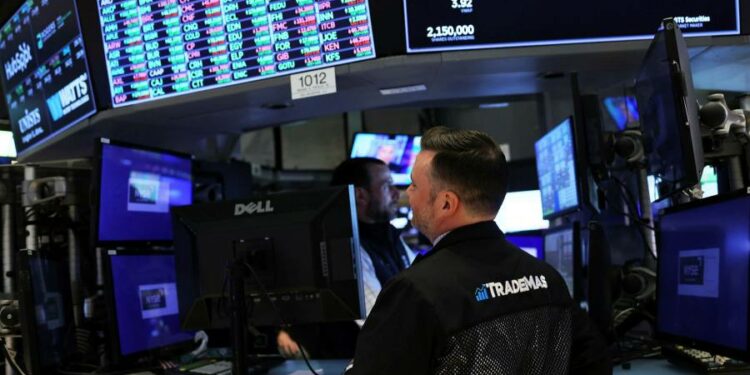Global stocks, government bonds and oil prices slid on Monday as investors worried about the effect of rising interest rates and inflation in Europe and the US, and coronavirus lockdowns in China.
Wall Street’s benchmark S&P 500 fell 1.2 per cent, led lower by technology and energy stocks. The tech-heavy Nasdaq Composite shed 2.2 per cent.
Hawkish comments from Federal Reserve officials helped push the S&P 500 to its first weekly decline for a month last week, and Mike Zigmont, head of trading and research at Harvest Volatility Management, said the developments had “ruined the mood” of even the most optimistic investors.
“Throw in the fact that yields are higher across the curve again and you’ve got a bearish environment,” he added. “Yields are just climbing, climbing, climbing and the wide-eye equity optimists can’t dismiss it any more.”
The US declines followed losses across most of Asia and Europe earlier in the day. The Europe-wide Stoxx 600 index lost 0.6 per cent, with the UK’s FTSE 100 dropping 0.7 per cent after data showed the UK economy barely expanded in February.
In Asia, the Hang Seng China Enterprises index of mainland Chinese stocks slipped 3.8 per cent and China’s benchmark CSI 300 index of Shanghai- and Shenzhen-listed shares shed 3.1 per cent as the impact of lockdowns imposed on Shanghai to limit the spread of Covid began to weigh on economic activity.
In government debt markets, the yield on the 10-year US Treasury note, which underpins global borrowing costs, rose 0.08 percentage points to a fresh three-year high of 2.78 per cent. Yields rise when prices fall.
The 10-year German Bund yield jumped 0.11 percentage points to 0.81 per cent, its highest level since mid-2015.
French markets provided a rare bright spot after the first round of presidential elections over the weekend. Incumbent Emmanuel Macron is expected to defeat far-right rival Marine Le Pen in the final round of voting in two weeks, though polls suggest a tighter race than in 2017.
Paris’s CAC 40 stock index ended the day 0.1 per cent higher, while the gap between French and German bond yields — a measure of the perceived riskiness of holding French debt — narrowed.
The euro initially rallied against the dollar before falling back to a 0.1 per cent gain for the day. “Overall, this is largely an as-expected result which will remove tension from the currency market and provide a bit of relief to the euro,” said Stephen Gallo, European head of forex strategy at BMO.
Oil prices dropped by more than 4 per cent, with Brent crude settling below $100 a barrel for the first time in almost a month. West Texas Intermediate, the US oil marker, dropped to less than $95 a barrel.
Plans to release record volumes of oil from strategic reserves and coronavirus lockdowns in China have driven the oil market to give up most of the gains that followed Russia’s invasion of Ukraine in late February. A period of extremely volatile trading since the invasion has seen the number of active futures contracts on Brent — also known as open interest — fall sharply.
“Continued Covid lockdowns in China, along with the co-ordinated US and IEA stock releases, are fuelling the capitulation in oil markets,” said Bart Melek, head of commodity strategy at TD Securities. “These forces have combined to ease immediate short-term pressures experienced from self-sanctioned Russian barrels.”











